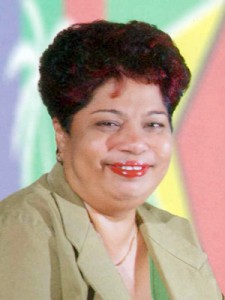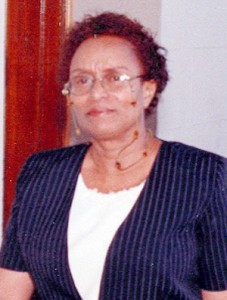


The objective of setting up the commissions was to strengthen governance and at the same time address matters of security.
The committee, which has been meeting regularly, has proposed a motion dealing with the establishment of the Rights of the Child Commis-sion to the Parliament Office for it to be included on the order paper for the next sitting of the house.
When contacted, Teixeira, who is Chairman of the Committee of Appointments, told Stabroek News that apart from the motion proposed, the committee was “going well” on the composition of the Women and Gender Commission and “there is some movement on the Indigenous People’s Com-mission.”
Unanimity was reached by all the representatives of the political parties on the Rights of the Child Com-mission, which Teixeira said was a good indication that it would be approved by the National Assembly.
As chairman, she said, she was positive that even though the deadline might not be met for the establishment of the commissions, the process was underway and they would be established shortly after.
She noted that the committee has already laid in Parliament an interim report in relation to the appointment of members of the Ethnic Relations Commission (ERC). This report, which indicates a stalemate on the composition of entities to be consulted, was laid on May 8.
The source of contention relates to the PNCR’s objection to the umbrella organisation, Inter-Religious Organ-isations headed by current Chairman of the ERC Bishop Juan Edghill, being included on the list to be consulted. The PPP/C has objected to the deletion of the IRO, which represents Christians, Muslims and Hindus but does not represent five other religious organisations. The five other religious organisations, which do not fall under the broad heading of Christians, Hindus or Muslims are the Baha’is, Rastafarians, Sai Baba organization, Apostolic Faith and the Jewish Orthodox Church.
According to Teixeira, the PNCR-1G was proposing the exclusion of the IRO and the five other religious organisations but the PPP/C objected along with the AFC, which subsequently changed its position in an effort to reach consensus.
However, the Baha’i community wrote a formal letter to the committee, indicating that excluding its faith would mean that it would not be represented since it was not a member of the IRO neither did it fall into the other religious groupings represented.
Objecting to the IRO and the five other religious groupings would be likened to throwing the baby out with the bathwater, she said.
Asked for her views on whether the deadline would be met, PNCR-1G MP on the committee, Amna Ally told the media at the PNCR weekly press conference at Congress Place on Friday that she was not sure that it could be met but added that the committee had been meeting regularly and some progress was made.
Referring to the stalemate on the ERC as it relates to the consulting entities and the IRO, Ally said the PNCR-1G did not see the IRO as necessary to the process.
PNCR-1G representatives on the appointive committee have argued that the IRO, which comprises representatives of the Christian, Hindu and Muslim community were already represented by their individual organisations.
In spite of the stalemate, Stabroek News understands that the PNCR-1G might be inclined to withdraw its objection to the IRO to ensure the appointment or reappointment of commissioners to the ERC.
President Bharrat Jagdeo extended the term of the ERC commissioners this year at the request of Parliament through a motion passed and supported by the ruling party’s majority after the life of the commission had ended in August.
However, this move has been deemed null and void since there was no constitutional provision for the President’s intervention.
PNCR-1G Chief Whip in Parliament, Lance Carberry, who was also present at the media briefing shared the view that while the focus was on the establishment of the commissions within a 90-day period, unless the commissions could function they would become “paper commissions.”
He noted the need for a functional secretariat to house the rights commissions to ensure that they were functional when established.
In relation to the establishment of the Procurement Commission, Carberry took aim at the PPP/C claiming that since the last meeting of the Public Accounts Com-mittee two weeks ago, the PPP/C had provided no names of persons to serve on the commission. The PNCR-1G has presented its list.
Contending that the seriousness of the PPP/C on the matter was questionable, he also said that ensuring the establishment of the commissions was not only in the lap of the political parties but civil society also has a responsibility to the citizenry. To date, there have been no submissions from civil society, he said.
AFC MP Sheila Holder said that while the deadline would not be met she felt that the committee, which has been meeting weekly since the commitment was made, has made significant progress.
However, while the focus was on the specific issue of establishing the rights commissions, she opined that some focus should be given to the reasons for the delays behind the whole process.
She said one of the reasons why consensus and colaboration were difficult to achieve was because the nature of Guyana’s politics did not allow the parliamentary political parties or politicians to be rewarded when they gave up their positions in trying to arrive at a consensus.
“I don’t believe that all the faults should be laid at the feet of the political parties,” she said adding that “the electorate don’t reward political parties by acknowledgement on the basis of their performance in the National Assembly, in government or as a parliamentary party,” she said.
Holder said she did not believe there would be positive change until that level of maturity, which placed emphasis on performance, was exhibited by the electorate.
The electorate including civil society, she said had to change its attitude of pandering to the incumbent and speak truthfully to the issues and understand that the independence of national institutions was fundamental to the change that the society sought to ensure good governance and ensure peace and security. One of the problems political parties now faced, she said was that they had no confidence that the people appointed to the commissions would respect the independence of the institutions to which they were appointed and would instead be influenced by politics. “This is the reason why the appointive committee at this stage cannot reach a consensus on the ERC,” she said.
In setting a deadline for the establishment of the commissions, Holder said, civil society and the political parties demonstrated a lack of understanding of the real issues or preferred to avoid attempting to deal with the real issues.
“There are still some hurdles to overcome. If we were to overcome them, it would mean that some amount of shift in positions would have to take place between the main political players.
Would that shift manifest itself in the independent operations of the various commissions?” she questioned.



